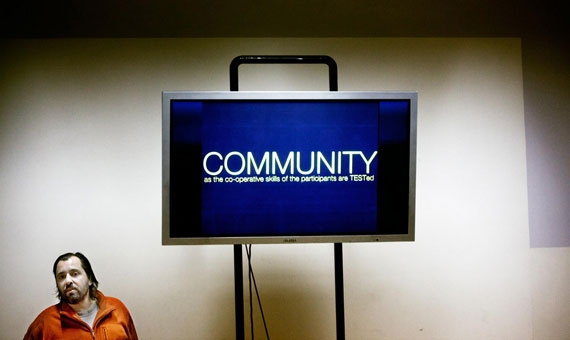Krétakör (Chalk Circle Theater) is said to be one of the most progressive and internationally acknowledged Hungarian independent theaters. Its founder is a highly original figure on several accounts.
Schilling is known for his commitment to the ultimate purpose of theater. This is what Krétakör has been working for right from the beginning. They have earned more than fifty awards so far, from the Canadian Mask Award to the Herald Angle from the Bank of Scotland. Árpád Schlling also received the Knight of Cross and the Order of Merit of the Hungarian Republic, as well as the title of the French 'Chevalier De L'Ordre Des Arts et Des Lettres' in 2008.
SEVEN YEARS OF IMPROMPTU
Schilling founded Krétakör in 1995, still before starting his theatre directing studies at the Budapest Academy of Theatre. During his studies he continued working with Krétakör, back then a free group, making eight, mostly award-winning productions, but he also staged several productions at the internationally known Katona József Theatre. “That part of the ouevre of Krétakör was shaped through a number of improvisations,” said Schilling, a daring experimenter.
“The first seven years were on a stable high standard and every single performance had its own independent artistic vision both in theatrical language and concept”. Actor Zsolt Nagy says “we performed in random places. I liked this working method, because it has increased my creativity. It was an excellent training to create performances within a small company. The Seagull has been performed in twenty-something countries.” The core group including Viktor Bodó, Gergely Bánki, Zsolt Nagy, Bori Peterfy, Annamaria Láng and Sándor Terhes was later completed by Zoltán Mucsi, Péter Scherer, Eszter Csákányi, László Katona and Lilla Sárosdi.
SEVEN YEARS OF WORKSHOP-ALCOHOLISM
Although the constellation worked fine, the debut of the play ‘Woyzeck’ brought change in 2001. It was a time to work together on a more systematic basis. This meant intense workshop-like effort for the whole period. Kretakor has never given in to theatrical cliches and was ready to invent independent interpretations of plays. Woyzeck by Georg Buchner is acknowledged to highlight this period. “Beginning my work on Woyzeck, I knew only one thing,” says Schilling in the performance’s leaflet. “This play would take place inside a cave. The performance was devised trough improvisations and physical exploration of the text. We did not want to reconstruct Buchner’s play but to recreate it once more.”
This is indeed the ethos in which they created Leonce and Lena, Death of Danton, Hazámhazám (Fatherland, my all), Siraj (Chekhov’s ‘Seagull’) and hamlet.ws (based on Shakespeare’s ‘Hamlet’). All these plays have two things in common: the radically new interpretation and the pure intimacy of the performance. There were even more expressive and more directly provoking pieces that responded to social problems, like A hideg gyermek (Meyenburg’s play, ‘The cold child’), FEKETEország (Black Land, based on SMS news, and improvisations of the ensemble), Mizantróp (Moliere’s, ‘Misantrope’). In 2008, the group was dissolved. Krétakör as an entity reassembled once again as a creative management company in 2008.
KRÉTAKÖR AS A CREATIVE MANAGEMENT
In theatrical sense today's Krétakör is not as experimental as it used to be. Instead, they are dedicated to expanding their artistic vision into the profit-oriented business world. They started by designing a campaign for Heineken Hungary to popularize moderate drinking. One of the most peculiar international projects last year was URBANRABBITs. The production consists of the personal stories of 16 circus artists, all graduating students of CNAC (French National Circus Academy) in Chalonsen-Champagne, acting out the main roles of their own lives. The concept of the show is a self-ironical reference to the human condition, not lacking humor. This performance that toured Europe, including France, Hungary, Italy, Romania and Serbia refers to the basic life experiences we all go through.
A village theater project of KÁVA - Cultural Workshop (a drama pedagogical association), entitled New Spectator was placed in two poor Hungarian villages. The idea was a supposition that if knowledge and experience transfer were more regular, people would learn not to be judgmental and start thinking about the way they think. In this project Krétakör was a participating partner, responsible for fulfilling theaterprofessional tasks, cooperated with anBlokk, a cultural research institute. The project also involved working with the villagers in Borsod. This summer,
Krétakör is invited to Prague Quadrennial, one of the biggest international events of theater experts to be organized in Prague, featuring 5,000 professionals from 76 countries and 30,000 visitors every year. Krétakör, the only theatrical organization representing Hungary, brings a project depicting the story of the twenty-one year old Jan Palach, an emblematic figure, who, in 1969, after the Soviets invaded Prague, set himself on fire at Vencel Square as a protest. According to Schilling, the meaning and significance of Palach’s sacrifice evokes the original function of the theater, which is purification. This cause is identical with Friedrich Schiller’ definition of the goal; ‘theater is meant to educate both the heart and the mind’.


Leave a Reply Cancel reply
Top 5 Articles
 MVM Buys Huge Solar Power Plant in Tázlár December 20, 2023
MVM Buys Huge Solar Power Plant in Tázlár December 20, 2023  Tensions Escalate Between U.S. and Hungary after… March 15, 2024
Tensions Escalate Between U.S. and Hungary after… March 15, 2024  Hungarian Central Bank Head Warns of Autonomy Under Threat March 1, 2024
Hungarian Central Bank Head Warns of Autonomy Under Threat March 1, 2024  Alpine Comfort at a Mountain Lake December 19, 2023
Alpine Comfort at a Mountain Lake December 19, 2023  Hungary Faces Economic Headwinds as Recovery Falters February 16, 2024
Hungary Faces Economic Headwinds as Recovery Falters February 16, 2024








No comment yet. Be the first!